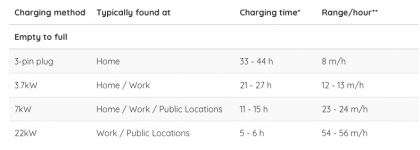Take off the rose tinted glasses.
I dont have rose tinted glasses, and i'm not stupid either.
I know that the current network would need massive investment and upgrades before it was ready to supply every car in the uk with a copious amount of electricity.
But then 130 years ago when Benz was building his first cars, there where no petrol stations, in many cases barely any roads.
The infrastructure will and is growing with demand, and many modern homes are more than capable of supplying more than 3kw, 3kw in the UK is what you get out of a normal socket, in any normal house.
You however as a representative of an oil company are misrepresenting this.... why is that ???
50 hours to charge a tesla is on 110V American mains not the U.
Absolute worst case you could charge a car at 3kw in a UK house and still boil a 3kw kettle, with some wiggle room to charge your phone.
In an average UK home, a home charger can be considerably more than 3KW
As I stated above, an Model 3 can be charged in 5 hrs on an 11KW home charger.
If I go to work my car can either sit in a car park for 8 hrs or sit at home for 8 hrs either way thats plenty of time in which to charge it to full. If I drive from home to work even a long commute to my Cambridge office is only 50 miles out of a 220 mile range, there is still plenty in the battery for getting me from home to the nearest hospital in an emergency.
At the moment people expect to be able to get in a car fill it with petrol and drive for as long as they want, because that's how things are.
The world needs to change, the environment depends on it, and people will have to change with it. I would happily drive down to Kent, have a coffee at the channel tunnel terminal while waiting for my train and while the car charged on a super charger for 30 - 40 mins.
I expect in the future cars could charge on trains or on ferries, and i would bumble across Europe stopping when needed to charge.
You're talking about electric car infrastructure and playing on the current drawbacks which would only actually apply if every car out there suddenly turned into an electric car over night, Which is not happening, But its going to be a slow and gradual process over many years.
Any oil company thats investing in building infrastructure to support with would likely want to hold back peoples investment in electric cars 1. so that they can make as much as possible from the outgoing fossil fuels which they still have huge amounts invested, and so they can build their presence in the market to be able to capitalise on future technologies.


